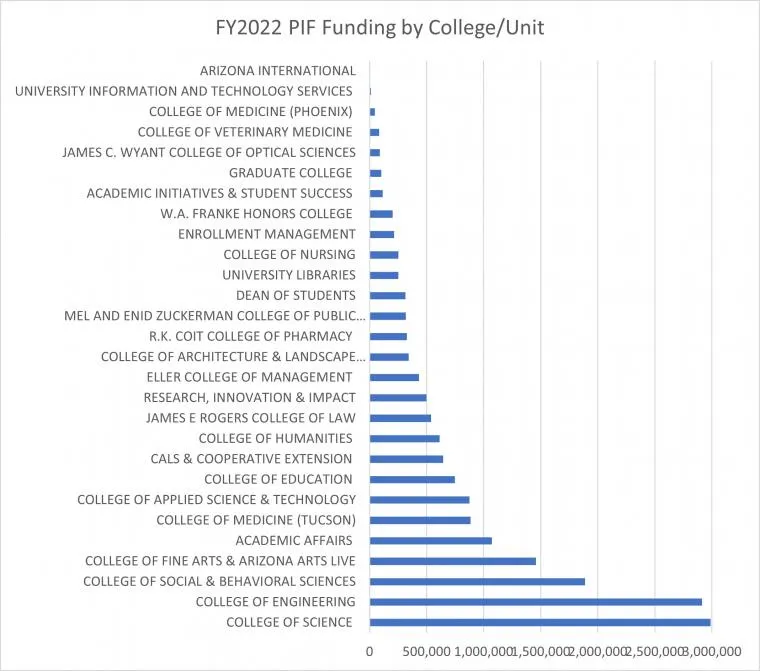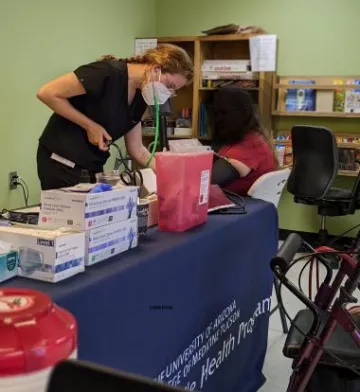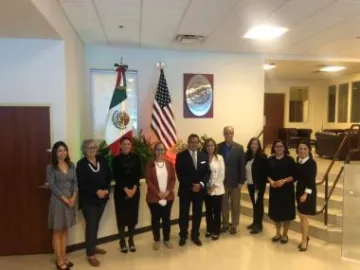FY2022 Provost’s Investment Fund Report
During Fiscal Year 2021-2022, the Office of the Provost received an allocation of $24,022,729 from the Responsibility Centered Management (RCM) budget model to fund the Provost’s Investment Fund (PIF). A total of $18,226,857 was allocated to initiatives (see Table 1) and transferred from PIF to the colleges and units shown in the graph below.
Most of the expenses are to fund strategic programs and initiatives such as Strategic Priorities Faculty Initiatives (SPFI), which aims to provide funding support to departments to hire tenure-track faculty or continuing track academic professionals who will enhance the university’s distinctive strengths in advancing Inclusive Excellence via equal opportunity, diversity, and inclusion as outlined in the University of Arizona’s Purpose and Values and Graduate Interdisciplinary Program (GIDP), which facilitates collaboration in cutting edge teaching and research between disciplines and fosters innovation and creativity among faculty and students. We made significant investments in upgrading and/or creating instructional and research facilities and infrastructure to augment teaching and learning experience and enhance research impacts; boosting academic and student support programs, as well as operational programs such as faculty salary and faculty awards.
A total of $2,581,097 was allocated for strategic initiatives awarded through competitive submissions in the Fall 2021 cycle and Spring 2022 cycle (see Table 2). Additional funding was provided from the Federal CARES Act allocation set aside for Hispanic Serving Institution (HSI) (see Table 3).

| CATEGORY | AMOUNT | % |
|---|---|---|
| Deans & Dept Heads Administrative Stipends | 1,455,772 | 7.99% |
| Distinguished Professors | 133,655 | 0.73% |
| Enterprise Systems | 633,770 | 3.48% |
| Facilities/Infrastructure for Research and Instruction | 1,045,138 | 5.73% |
| Faculty Awards | 82,325 | 0.45% |
| Faculty Partner Hires | 1,249,117 | 6.85% |
| Faculty Retention | 130,126 | 6.85% |
| Faculty Salary Support | 2,045,368 | 11.22% |
| Faculty Retirement Buyouts | 165,000 | 0.91% |
| Graduate Interdisciplinary Program (GIDP) Faculty Salary Support | 173,575 | 0.95% |
| Instructional/Academic Support | 1,759,675 | 9.65% |
| New Academic/Student Program | 1,686,637 | 9.25% |
| Promotion & Tenure Committee | 18,000 | 0.10% |
| Provost's Discretionary Support | 278,168 | 1.53% |
| Regents Professors Salary Support | 155,170 | 0.85% |
| Research Support | 1,745,983 | 9.58% |
| Shared Governance Support | 93,550 | 0.51% |
| Strategic Hiring Commitment/Start-up for Deans & Dept Heads | 3,781,868 | 20.75% |
| Strategic Priorities Faculty Initiative (SPFI) | 1,056,212 | 5.79% |
| Student Support | 537,750 | 2.95% |
| TOTAL | 18,226,857 | 100.00% |
| PIF Cycle | Amount |
|---|---|
| Fall 2021 | 1,512,000 |
| Spring 2022 | 1,069,097 |
| TOTAL | 2,581,097 |
| Cycle | Amount |
|---|---|
| Fall 2021 | 820,267 |
| Spring 2022 | 561,648 |
| TOTAL | 1,381,915 |
Family Medicine CARES (Community Access, Referral, Education and Services for Health) Project
Family Community Medicine, College of Medicine-Tucson

Family Medicine CARES (Community Access, Referral, Education, and Services for Health) is a pilot project of the Department of Family and Community Medicine (DFCM) that brings inter-professional education into the community. The project is conducted onsite at Tucson House, a 408-unit public housing complex and the largest government-supported housing complex in the city. The complex includes low/very low-income seniors, the disabled, and those who have been previously unhoused. Under the supervision of DFCM clinical providers and staff, University of Arizona students (medical, nursing, and public health) are provided with an experiential learning opportunity by performing health screenings and coordinating linkages to health care, mental/behavioral health, and psychosocial services.
The project met the major goals such as completing training with the first cohort of students on how to conduct health screenings and communicating health information to the residents and scheduling and coordinating screening visits at Tucson House. From January to July 2022 there were 114 persons screened at Tucson House.
Some of the expected outcomes from the project are that there would be an increase in the students’ clinical and interpersonal skill sets along with confidence in working in an inter-professional team within a cross-sector place-based community project. Additionally, students gained augmented knowledge regarding the social determinants of health and their impact on health care access, and comfort working with diverse community members with complex medical and psychosocial needs. “We noticed that the students are becoming aware of the challenges faced by an underserved population in accessing health care,” Ronald Sorensen, executive director of Community Engagement, said.
From Natural Language Contracts to Smart Contracts
Computer Science, College of Science
This project aims to demonstrate the feasibility of using algorithmic techniques, such as natural language processing (NLP), software analysis, and semantic modeling, to bridge the gap between human-language wills and software-based smart contracts (contractual agreements implemented via blockchain-based software). The project's longer-term plan is to leverage its results to democratize emergent blockchain-based technology, thereby promoting accessibility and inclusivity, by developing affordable and trustworthy techniques to translate human-language wills into smart contracts. For affordability, the project aims to automate the translation process for trustworthiness and to make the resulting smart contracts verifiable to ordinary end users. The PIF is used to collect preliminary results to demonstrate that the above longer-term effort is feasible by demonstrating that natural language wills can be converted into structured data, which can serve as an intermediate representation toward the semantic representation to be implemented using smart contract code.
In January 2022, the team submitted the proposal DASS: A Framework for Accountable Smart Contract Wills to the National Science Foundation (NSF) Designing Accountable Software Systems program. The team was informed recently that this proposal has been funded by the NSF for $748,328 for over three years. The PIF funding was instrumental in increasing the attractiveness of the NSF DASS proposal by supporting the preliminary study that, as of this summer, has already produced results, according to the project team including Saumya Debray, Derek E. Bambauer, Clayton Morrison, and Mihai Surdeanu.
Borderlands Education Center Development Project
Department of Teaching, Learning and Sociocultural Studies, College of Education

The Borderlands Education Center (BEC) was established to create an intellectual hub in the rural borderlands of Southeastern Arizona and Northern Mexico, thereby expanding learning and research opportunities for border teachers, researchers, and communities. The Center supports initiatives that address the complex educational issues on borders and foster the development of networks of border teachers and researchers. It also sponsors the Teacher Identities Institute addressing the border educational context, promoting diversity and inclusion, and knowledge exchange with scholars and preservice and in-service teachers.
According to PI Iliana Reyes and Co-PI Nadia Alvarez Mexia, the Provost’s Investment Fund has provided a significant institutional and financial infrastructure to achieve and further promote BEC’s educational and pedagogical goals. The PIF grant has been fundamental for the Borderlands Education Center (BEC) in the College of Education to lead efforts in fostering pedagogical initiatives for teachers and educators in Southern Arizona and Mexico (Sonora, Sinaloa, Guanajuato, Tabasco). The program initiatives center on creating sustainable efforts based on pedagogical expertise, educator development, transborder collaborations, student recruitment and retention, and innovative research.
A quote by one of the participants from the Summer 2022 Teacher Identities Institute,
“Fue una experiencia realmente única y enriquecedora, quedo muy agradecida y satisfecha con todo el conocimiento que se brindó durante cada una de las sesiones, el cual sé que me servirá de mucha ayuda en un futuro cuando sea una profesional de la educación .” (Transnational Pre-service teacher from Sonora, Summer 2022 Institute)
“[The Teacher Identities Institute] was a unique and enriching experience. I’m grateful and satisfied with the knowledge that was shared during all sessions; this would support my future as a professional in education.” ( Transnational Pre-service teacher from Sonora, Summer 2022 Institute ).

